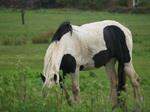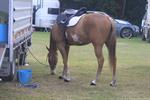Learn to care and manage horses
 Develop the ability to handle horses and understand their psychology.
Develop the ability to handle horses and understand their psychology.
- Gain an understanding and acquire the skills to evaluate horses' conformation, their diet and their environment.
- The course also looks at the commercial elements of the industry, such as farm management and breeding, including buying and selling horses and much more.
- Course Duration: 100 hours of self-paced study. Start at any time.
COURSE STRUCTURE AND CONTENT
The course comprises 7 lessons as follows:
1. Horse Psychology and Handling
- The horse's memory.
- Using psychology to handle the horse.
- Handling the horse in various situations.
- Catching a horse.
- Putting on a head stall or halter.
- Leading a horse.
- Putting on a bridle.
- Taking off a bridle.
- Saddling and unsaddling.
- Tying up a horse.
- Safety.
2. Buying A Horse
- Temperament.
- Size and weight carrying ability.
- Age and sex.
- Colour and marking.
- Breed.
3. Conformation
- Factors affecting conformation.
- Ideal conformation.
- How to describe conformation.
4. The Digestive System and the Principles Of Feeding and Watering
- The alimentary canal.
- Absorption of food.
- Groups of nutrients.
- Composition of some common feeds.
- Principles of watering.
- Principles of feeding.
- Ideal proportions of food types.
- Calculating rations.
5. The Grass Kept Horse & Pasture Management
- Develop appropriate procedures to manage a horse at grass.
- Advantages of working off grass.
- Disadvantages of working off grass.
- Paddock size.
- Types of fencing.
- The supply of water.
- Shelter.
- General management.
- Exercise and grooming.
- Land conservation.
- Other factors.
- Roughing off and turning out.
6. Grooming
- The skin.
- How the skin regulates body temperature.
- Grooming tools and methods.
- Washing the mane and tail.
- Caring for grooming tools.
7. Industry Applications
- Explain commercial opportunities available in the horse industry.
- Resources.
- Writing resumes.
- Competition horses.
- Educating horses.
- Breeding.
- Farm planning.
- Quality management systems.
- Whole farm planning.
- Preparing a farm business plan.
- Managing risk.
- Sensitivity analysis.
- Financial planning.
- Financial records.
Each lesson culminates in an assignment which is submitted to the school, marked by the school's tutors and returned to you with any relevant suggestions, comments, and if necessary, extra reading.
COURSE AIMS
- Differentiate between the different procedures used for the handling of horses.
- Describe the procedures for the buying and selling of horses.
- Develop a program for the evaluation of the conformation of horses on a property/facility.
- Analyse the digestive system, including structure and function, of horses.
- Develop appropriate procedures to manage a horse at grass.
- Explain the methods used to prepare horses for specific uses, including their grooming for different tasks.
- Explain commercial opportunities available in the horse industry.
WHAT YOU WILL DO
- Describe different psychological traits of a horse including:
- herd instinct;
- memory;
- fright.
- Explain how horse psychology can assist with handling a horse.
- Compare different methods of breaking in a horse for domestication.
- Demonstrate how to put on different pieces of tack including:
- a head stall;
- a bridle;
- a saddle.
- Demonstrate how to lead, then how to ride a horse.
- Develop safety rules for handling horses.
- Compare differences in how owners handle their horses, at the same event or meeting.
- Describe different ways of buying or selling horses.
- Develop a checklist of factors to consider when buying a horse for a specified type of use.
- Compare different advertisements for the sale of horses of a similar type.
- Evaluate the features of a horse being offered for sale in your locality, to determine the value of that horse.
- Label an unlabelled diagram of the parts of a horse's body.
- Define the different conformation terminology, including:
- girth;
- body proportions;
- leg settings;
- conformation;
- bone.
- Describe the preferred features of the parts of a horse's body.
- Compare the conformation of two different breeds of horses, based upon a physical inspection of a horse from each breed.
- Compare procedures used to evaluate the conformation of horses at two different properties/facilities.
- Identify parts of the digestive system of horses.
- Explain the function of different components in a horse's diet.
- Explain how the watering of a horse, as observed by you, on a specific property is likely to affect that horses' digestive processes.
- Evaluate the digestive processes involved in the digestion of three different horse feeds analysed by you.
- Differentiate between the digestive processes in three different types of horses, including:
- very active horses;
- horses being rested.
- Compare the advantages with the disadvantages of keeping a horse at grass.
- Recommend paddock facilities, in your locality, which are appropriate for horses kept at grass.
- Prepare a description, and use illustrations where appropriate, of the facilities you recommended.
- Differentiate between the requirements of a specified horse kept at grass, at different times of the year, in your locality.
- Develop guidelines for managing a specific horse at grass, on a property visited and investigated by you.
- Explain different husbandry tasks which are essential to the management of the horse investigated by you.
- List the different reasons for grooming horses.
- Describe how to use different items of grooming equipment.
- Write a procedure for washing a horse, in a specified situation.
- Compare how to groom horses for different situations, including:
- dressage;
- pony club competition;
- exhibitions;
- stock work.
- List the different applications for horses in modern society.
- List the resources available for different sectors of the horse industry in your locality, including:
- racing;
- breeding;
- competitions;
- recreational riding.
- Determine the minimum facilities required to establish three different specified businesses in the horse industry, including:
- a riding school;
- a stock agent;
- another horse business.
- Evaluate the financial viability of different sectors of the horse industry.
- Evaluate the potential of different specified horse enterprises in your locality.
WHERE TO BUY A HORSE?
 From friends
From friends
Friends can be a great source to start with. Finding out about good horses through word of mouth can be honest way of getting to know what horse is appropriate for your skill level or what horse is capable of achieving the level you want to take the horse to.
Other means of buying and selling horses include classified adverts in newspapers, magazines and websites. Be wary of adverts which list vices or phrases such as “experienced riders only” or “bucks when excited” as often these horses are demanding and may present problem behaviours which are difficult to rectify.
Auction sales
Adverts in magazines or online will also be used to raise awareness or interest in horses which are going to be sold in auction houses. There are different kinds of auction sales such as local weekly, breeder associations or speciality performance for example. You may wish to consider using an auction to find breed specific or performance horses – it can be a great saving financially to buy from an auction, however alternatively it bring many headaches if a purchase it not a sound one.
Trainers and rehabilitators
This group of people may have a variety of horses to sell and will aim to match the horse’s temperament and the rider’s ability level. Most of the horses sold by this group will have experienced problems in their life and will have through re-education or training. Overall, trainers and rehabilitators give horses a second chance to be homed in a caring environment.
A disadvantage of approaching dealers or rehabilitators is their honesty may be questionable. Check the credentials and reputation of the seller before even going to see a horse. It is important that you know the type of person you are dealing with before even considering buying from them. It has been known that horse’s problems can be covered up or temporarily hidden, so remain cautious. Encourage the trainer to be honest with you; you already know the horse is with the trainer for a reason. Ask to know of all the problems the horse has experienced and take a vet with you too.
Farms and breeders
Breeding farms are in business to sell quality horses. They know their stock must be quality as their income depends on it. With this in mind, it is very likely you will find the best horses direct from breeders' farms. Generally, breeders specialise in a particular breed e.g. Clydesdale.
Buying a young horse from a breeder means you will be responsible for breaking the horse yourself. Prices for buying from farms and breeders will vary due to the lineage of the horse and links to show winners or competition winners.
HOW THE COURSE WORKS
You can start the course at any time.
It is studied by distance learning, so you can study in the comfort of your own home. But this doesn't mean you are all alone in your studies. Our highly qualified and friendly tutors are there to help you every step of the way. If you have any questions at all, they are always happy to help.
THE ADVANTAGES OF STUDYING WITH ACS
- You can start the course at any time and study at your own pace (we do not impose a time limit for you to complete your studies).
- Fit your studies around your own busy lifestyle - we provide full tutor support for all the time you are studying.
- Study where you want to - online studies offer the flexibility for you to determine where and when you study.
STUDENT TESTIMONIAL
" My time with ACS has been extremely beneficial... and I would recommend the school to anyone seeking to study by Distance Education"
Victor, studying Adv. Certificate in Applied Management (Horses)
WHAT NEXT?
Enrol
Go to “It’s Easy to Enrol” box at the top of the page and enrol now.
Get Advice
Email us at info@acsedu.co.uk or use our FREE COUNSELLING SERVICE to contact a tutor.